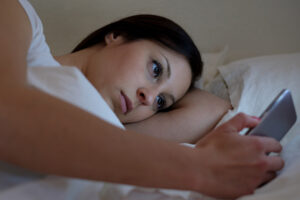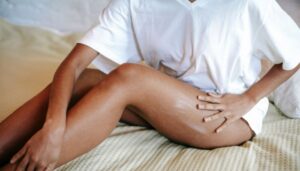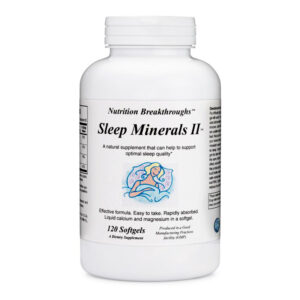A night sweat is a “hot flash” that occurs in the night, often while one is sleeping. A hot flash, also called a hot flush, is a sudden unexpected feeling of warmth and often a breakout of sweating in the upper half of the body. These flashes are experienced by 80% of women around the time of menopause, and men can also have them due to a lessening of testosterone.
At night time while a woman sleeps, her body temperature rises steeply just prior to a hot flash, causing her to wake up. The National Sleep Foundation writes that as many as 61% of post-menopausal women report having symptoms of insomnia and less satisfying sleep, due in part due to hot flashes interrupting their sleep with frequent awakenings.
Dr. John R. Lee, M.D. explains the source of hot flashes in his book: “What Your Doctor May Not Tell You about Menopause”. There is an area of the brain that controls the amounts of estrogen and progesterone made by the ovaries. When these two hormones become depleted as in menopause, the brain sends out signals for the ovaries to make more hormones, but they no longer respond to these prompts.
The signaling system can go awry as the brain sends out more and more signals and actually begins to “shout”. This over-activity begins to affect adjacent areas of the brain; particularly the area that controls body temperature and sweating mechanisms — thus the occurrence of hot flashes.
Sometimes spicy food, hot beverages, caffeine, alcohol or cigarettes can bring on a hot flash. For help with night sweats in bed, keep the bedroom cool and keep a washcloth in a bowl of ice near the bed to use on the forehead or chest as needed. To minimize hot flashes during the summer weather, stay cool by using fans and drinking cold drinks. Keep air conditioners on and make sure that air is circulating throughout the room. Dress in layers so you can peel them off as needed.
Vitamins E and C have been shown in studies to help reduce hot flashes. One study supporting vitamin E was published in “Gynecologic and Obstetric Investigation” and concluded that vitamin E is effective and is a recommended treatment for hot flashes.
Extensive research indicates that vitamin C strengthens blood vessels and acts as a potent health enhancement. In a study that combined vitamin C with bioflavonoids (the white matter on the inside of orange peels), 67% of the subjects reported complete relief from hot flashes.
The minerals calcium and magnesium can also help with deeper, sounder sleep, particularly because estrogen in women and testosterone in men helps to keep these minerals in circulation in the body and when these hormones are depleted, more frequent mineral supplementation is needed.
Sleep Minerals II from http://www.NutritionBreakthroughs.com is an example of a natural insomnia remedy that provides good results for menopause symptoms. It contains highly absorbable forms of calcium and magnesium, the best minerals for sleep and insomnia, heart health, restless legs syndrome and bone strength. The formula also includes vitamin D and zinc and is delivered in a softgel form with healthy carrier oils, making it more quickly absorbable than tablets or capsules and providing a deeper, longer-lasting sleep.
Valerie from Santa Clarita, California says: “I had such bad menopause insomnia that it took me hours to fall asleep even though I was extremely tired. My legs also had crawling and tingling feelings at night. I got the Sleep Minerals and took them and after a few days, it started to work really well. I fall asleep now within 20 minutes and no more restless legs.”
For more information on Sleep Minerals II, click here: http://www.NutritionBreakthroughs.com/html/sleep_remedy_for_insomnia_help.html





